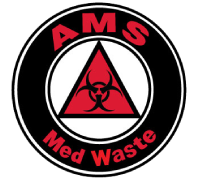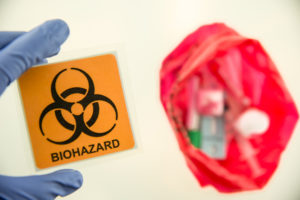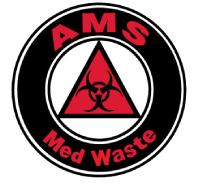Proper Medical Sharps Disposal
Medical waste offers various challenges and health risks at the best of times. It is a constant concern for those that produce and deal with it. Among the different kinds are medical sharps, which pose unique challenges.
To start things off, you may be wondering what medical sharps are. As the name implies they are sharp or pointed objects. Well that was a little obvious wasn’t it? To give some details, it includes items like the following: needles, blades, staples, broken glass, etc.
Now that’s cleared up, the reason these pose such a challenge is because they will cut through traditional red bags. A solution to this already exists of course in the form of solid containers. These are designed to safely handle sharps, and other waste as well, better than red bags. So now that we have that established, let’s go over some things you should and should not do when disposing of sharps.
What You Should Do For Medical Sharps Disposal
When you have sharps, immediately place them in a solid container. Leaving them laying around loose is too large of a risk. Getting a cut or puncture from used sharps is a huge medical risk, and needs to be avoided with vigilance.
If you don’t have access to a proper FDA endorsed disposal container, and are forced to use something else, do your best to choose one that has the basic features. Good solid construction that won’t get punctured or cut open. A sealable lid with a tight and secure fit that won’t pop open.
Follow your community guidelines for sharps disposal if you are doing it yourself. We’d recommend that you pick a professional service to help you out. If there is no service provider nearby, seek out your local health department and make inquiries about any sharps disposal programs they might know of.
What You Should Not Do
Whatever else happens, do not throw your sharps into the trash and or recycling. These items are not meant to be disposed of in this way. The risks of contamination they pose must be taken seriously. Not only are the materials non recyclable, any workers who end up handling them are at serious risk of getting hurt and infected from them. Also, don’t even think about flushing them down the toilet, that’s not an option either.
It’s in fact best to avoid interacting with used sharps altogether if you can avoid it. If you can not, don’t handle them without gloves or a pair of grabbers. Keeping them as far away from your skin as you can. For needles, a needle clipper would be best for this. Also never try to break, bend, or remove needles used by another.
So there we have it. For a more detailed list, we recommend this guide from the FDA. The medical risks posed by medical sharps should not be underestimated. Absolutely don’t take chances with this sort of thing, and if you do handle them, then do so properly.






